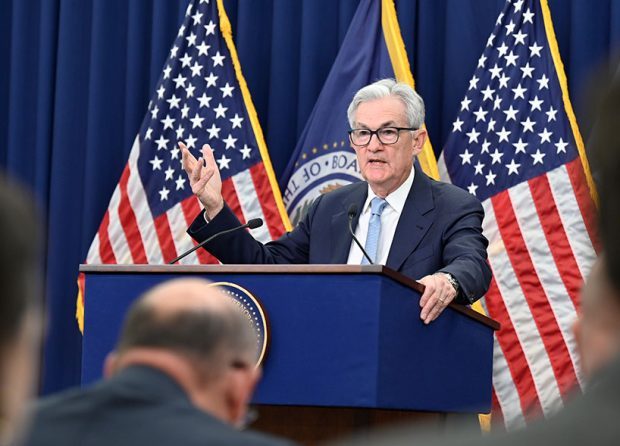NAFCU Chief Economist Curt Long said “the committee essentially split the difference” between pausing and raising rates.
Powell says an economic downturn might substitute for further rate hikes.
 Fed Chair Jerome Powell answers reporters’ questions at the FOMC press conference Wednesday. (Source: Federal Reserve)
Fed Chair Jerome Powell answers reporters’ questions at the FOMC press conference Wednesday. (Source: Federal Reserve)
The Fed said Wednesday it will raise rates by 25 basis points, but might hold off on further cuts if the economy worsens.
The Fed’s Open Market Committee raised the target range for the federal funds rate to 4.75% to 5%, following a 25 bps hike after its Feb. 1 meeting that raised the range to 4.5% to 4.75%.
Fed Chair Jerome Powell said the Fed is changing its posture from expecting “ongoing” rate increases this year, to “some might be appropriate” if recent banking turmoil isn’t enough to cool inflation.
NAFCU Chief Economist Curt Long said “the committee essentially split the difference” between pausing and raising rates. It raised rates but “did not raise its projected terminal fed funds rate and softened the tone of the statement regarding the likelihood of future rate hikes.”
 Curt Long
Curt Long
Mike Fratantoni, chief economist for the Mortgage Bankers Association, called the move a “dovish hike” because the Fed’s “commentary and economic projections suggest we may be at or near the peak Fed funds rate for this cycle.”
Half of the members at this week’s meeting said they expect the federal funds rate will end the year at 5.1% — unchanged from the median at December’s meeting.
Powell said any further rate hikes this year will be balanced against tightening of credit conditions that might occur in the wake of failures of two mid-sized banks earlier this month.
The FOMC statement said “recent developments are likely to result in tighter credit conditions for households and businesses and to weigh on economic activity, hiring and inflation.”
Powell said he doesn’t know yet the extent and duration of those effects.
“It is possible this might turn out to have very modest effects,” and further rate hikes might be necessary, or the economic effects will tighten credit, “and monetary policy will have less work to do.”
“You can think of it as the equivalent of a rate hike,” he said.
Powell said the committee considered pausing rate hikes, but inflation had come down slower than it expected. He said the Fed has gained public confidence that it is committed to taking whatever action is necessary to lower inflation to its 2% goal. “It is very important we sustain that confidence with our actions as well as our words.”
As usual among Fed chairs, Powell hedged many of his comments. But he twice dismissed the idea of rate cuts. His last comment in Wednesday’s news conference was an unprompted: “Rate cuts are not in our base case.”
The FOMC was more pessimistic about economic growth this year and next, and expected higher inflation this year compared with their views in December.
Half of the committee members expected real gross domestic product to grow 0.4% this year and 1.2% in 2024. In December, the median outlook had been for 0.5% growth this year and 1.6% growth in 2024.
Most members expected higher inflation this year in either of its two key measures. The median inflation expectation measured by the price index for personal consumption expenditures (PCE) rose from 3.1% at their December meeting to 3.3% this week. The median forecast for core PCE inflation, excluding food and energy, rose from 3.5% in December to 3.6% this week.
Fratantoni, the MBA economist, said inflation is slowing, and slowing wage growth shows the strong job market is weakening.
 Mike Fratantoni
Mike Fratantoni
“Coupled with the advent of much tighter financial conditions after the events of the past couple of weeks, we are anticipating a much slower economy over the next few quarters — which should further bring down inflation per the Fed’s goal,” Fratantoni said.
Fratantoni said the Fed’s actions support the MBA’s forecast that the 30-year fixed rate will fall to 5.3% by year’s end. On March 17, it stood at 6.48% — its lowest level in a month.
Falling mortgage rates “should provide support for the purchase market,” he said. “The housing market was the first sector to slow as the result of tighter monetary policy and should be the first to benefit as policymakers slow – and ultimately stop – hiking rates.”
Comments
Post a Comment
Please no profanity or political comments.